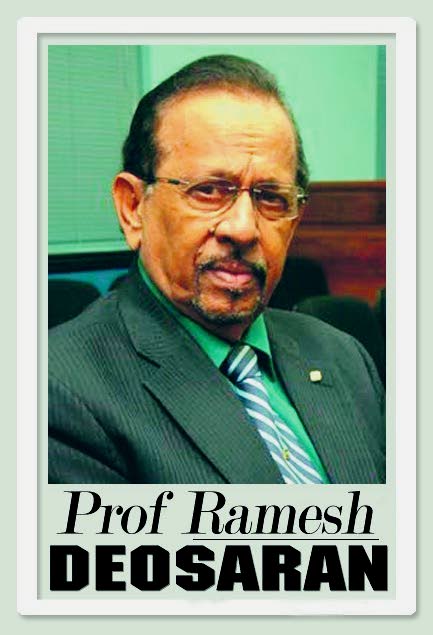Society haunted by race

“Haunted” means “frequented by a ghost; persistently in the mind.” And if there is one thing that persistently occupies the mind, thoughts and actions of people in this country it’s race, in whatever form of fashion. We had lots of that in recent weeks and likely more as we head into the elections.
Two races have been freed but a society is not yet born, declared former PM Dr Eric Williams. We remain haunted by race, however defined. No matter how much some try to ignore or reject it, how others try to pretty it up, there it is, often in battle for scarce resources. And it could get ugly. Sometimes just as you we have the harmony, bam, it flares up again.
This brief comment is of course nothing new. Numerous commentators, scholars and editorials have repeatedly made the point. Will things ever change? If our race relations, prejudices and all, have been socially constructed, is it too late for them to be deconstructed? Is the political system such that it encourages racial voting?
I suppose it depends on what you are looking at. For example, many of us of whatever race see the races living harmoniously in everyday fashion, but periodically interrupted by election campaigns. Others feel party members already possess racial preferences which become activated by leadership rhetoric and code words. But then some scholars ask: are members of political parties so naive, so gullible, that they can be easily swayed by their leaders into racial disaffection against their fellow citizens? Is this mental slavery or what? However, no one confesses to voting by race. Political leaders deny, even condemning it. Race is not put on the ballot paper. The practice is determined by inference, a kind of underground psychology that exists as a natural law of politics.
We continue to wish for something that seems so impossible. How and where should improved racial harmony begin? In families, schools, churches, temples, mosques or in political parties? Should it emerge by constitutional reform with some form of proportional representation? Or should the races be left alone to fight it out using the rights and freedoms expressed in the Constitution and several institutions like service commissions and the Equality of Opportunity Act? Could the courts help?
Look, there is no easy solution mainly because, for too many, the racial division provides substantial benefit. They like it so. In fact, each side has its heroes. Racial voting becomes pernicious, however, when it results in putting race before merit.
Now as much as racial voting is formally despised, there is another reality to confront. That is the right of a citizen to vote the way or for whom he or she chooses. Whether that means voting according to race, gender, religion, region, labour or business preference. This is a constitutional right even when energised by prejudices and stereotypes. But what does “issue-oriented” voting really mean, precisely? Is it a moral obligation for the common good and beyond self-interest?
There are, of course, issues affecting one’s race, religion, gender, even labour or business interests. So all this brings us to the central question of democracy itself. How can representative government materialise if it does not reflect, represent, citizens’ concerns and interests which include their religion or race? Each one is protected by law but in effect, remains politically divisive in varying extent. Why is such pluralism offensive? Which brings us to the historically haunting question: How can self-interest be converted into the common good?
This phenomenon of self-interest voting, racial or religious, however, cannot be wished away or easily described as being unpatriotic. From voting evidence around the world, especially in multi-racial societies, voting by race or religion seems so functional and persistent that it can be called the natural law of politics. The challenge is how to accommodate this natural law of politics into the political system rather than having the system pressed down uncomfortably upon this natural law? Or would evolution ever reduce the attachment to race and religion in favour of purely common interests? What about affirmative action or racial voting for current or past discrimination?
Most racial actions and perceptions are really reactions to actions, real or anticipated, stimulated by the other racial group(s). It is Newtonian. When one racial group expects or anticipates that the other group will execute racial voting, they decide to do it as well, in defense. Somewhat like “is we time now.” And so all racial groups become equally trapped in racial voting. This multiracial society functions largely by the reciprocal imaginations and perceptions which one group has of the other. When faced with competition for opportunity and scare resources, like elections, relative deprivation becomes the wheels on which racial voting travels. It looks like we will always be haunted by race, leaving us with the old challenge to find the fairest and most comfortable way to live with one another.

Comments
"Society haunted by race"